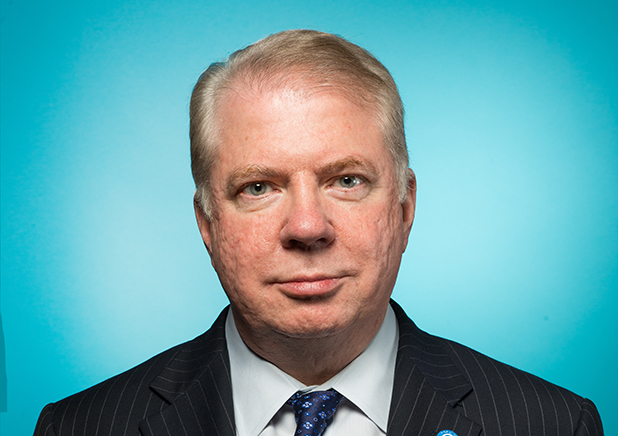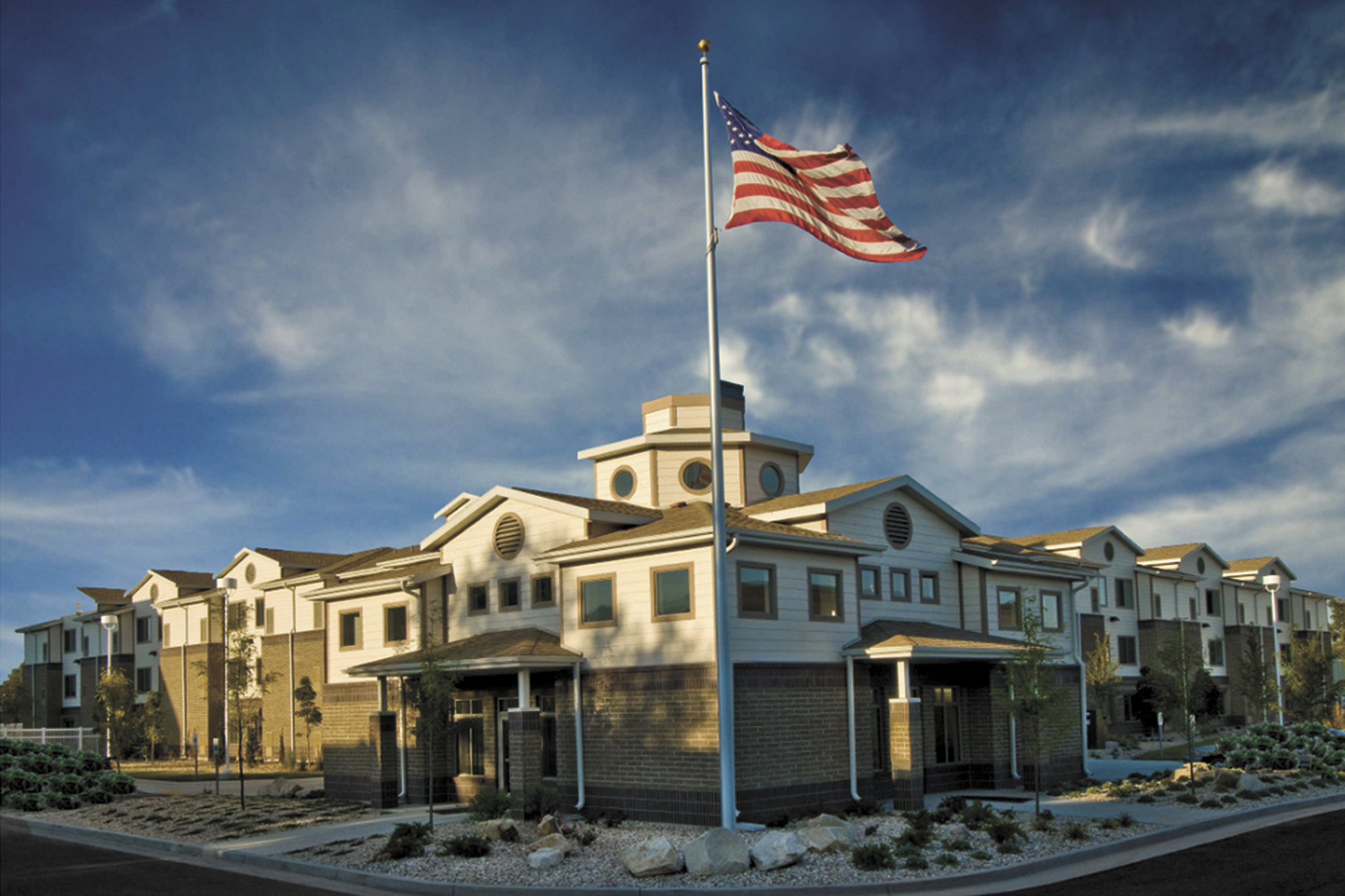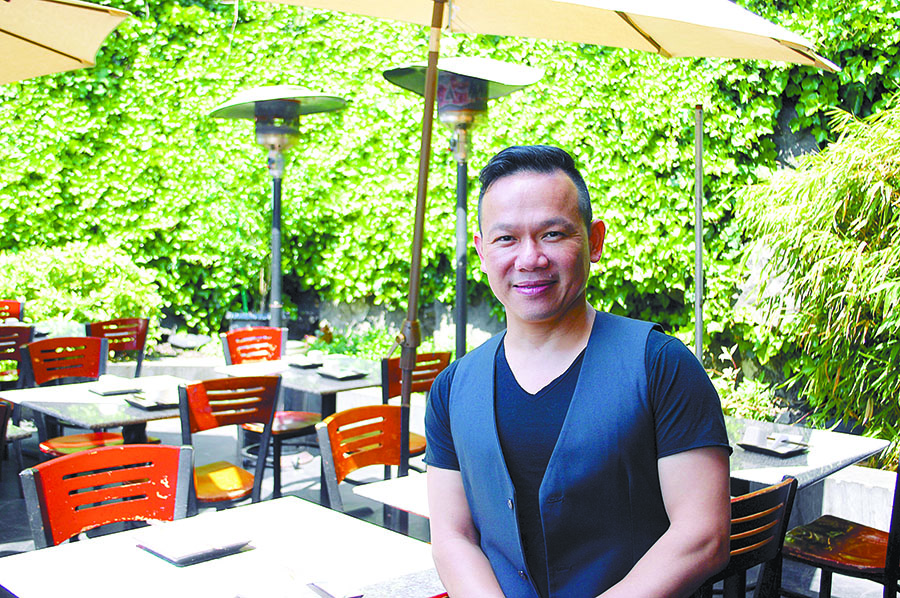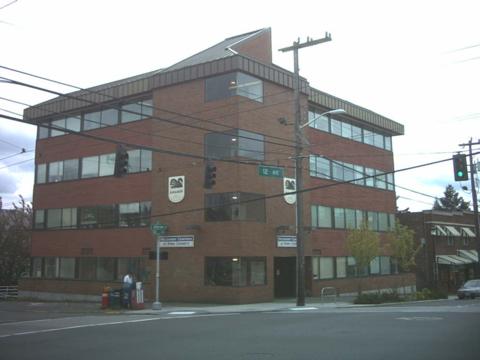The morning of November 25 broke dark and wicked cold. Ed Murray had been up late the night before. Weary and worried, he didn’t get to bed at his north Capitol Hill digs until after 1 a.m. A grand jury’s decision the evening prior not to indict Officer Darren Wilson had oozed out like a sore badly lanced, and as fiery protests sparked in the racially inflamed St. Louis suburb of Ferguson, Mo., Murray wondered what this might portend for Seattle. He prayed it would not be anything like a repeat of the WTO riots that shook the city in the late fall of 1999, the mishandling of which cast a lingering pall over the tenure of then-Mayor Paul Schell.
At a hastily called news conference that Monday night outside his seventh-floor office at City Hall, Murray, flanked by Seattle Police Chief Kathleen O’Toole, appealed for peace as dozens of demonstrators marched through Seattle, some blocking Interstate 5. At one point, his words sloppy, he characterized the fatal shooting as the “murder of Mr. Brown,” prompting his press secretary Jason Kelly to later clarify that the mayor had meant to say “death.” Later in his remarks, Murray steered close to overegging the pudding when he said his message to young African-Americans was this: “We in this city hear you. We in this city love you.”
But that’s Edward Bernard Patrick Murray for you. While it’s true he’s as pragmatic as a bar of Ivory Soap, a first-rate political collaborator and coalition-builder, the mayor is also an emotional man. He’s quick to anger, but even quicker to laughter and self-deprecating humor. Still, unlike most Irish pols—such as his hero, Robert Kennedy—Murray is a policy wonk by trade and, by his own admission, an introvert by nature.
I remember watching him before a mayoral debate in the summer of 2013, a few weeks before the August 5 primary. All the other candidates were chatting it up with reporters and the Town Hall audience that had come to witness the tussle. But Murray—then an accomplished State Senator—stood alone, awkwardly so, until at last, mercifully, one of his rivals, City Council member Bruce Harrell, sidled up next to him to say hello. Glad-handing is not his strong suit. And neither is he a gifted public speaker, often coming across as stiff, unblinking. But watch him hit the high notes when he’s not reading from a prepared text.
Murray loves power and the theater of politics. Just before taking office, he inhaled If Mayors Ruled the World by Benjamin Barber, a treatise on how mayors are the most effective and pragmatic of all political leaders because they have to get things done. Murray’s an avid reader of political biographies. I ran into him at the Seattle Rep the Sunday before our interview that late November afternoon. He and his husband Michael Shiosaki had come to see the enthralling political drama All the Way, a Tony-award-winning play chronicling Lyndon Johnson’s strong-arm efforts to pass the 1964 Civil Rights Act. When I mentioned the play during our interview, Murray said, “Johnson took things very personally; I don’t.”
The mayor is at his happiest when he’s immersed in briefings from department heads, being “deep in the details,” as he likes to say. A Seattle Department of Transportation official confides, “Ed totally gets off reading the dullest shit you can imagine. He’s like Dukakis that way. Remember him?” At the same time, Murray needs some time away from the spotlight’s glare, whether it’s walking his dog, a King Charles spaniel named Rory; or bird-watching in fields near the University of Washington; or heading off to Carmel, as he did this past July, for a reflective respite at a Benedictine monastery.
“I’m not sure people know just how deep his faith is. He’s a very spiritual person,” says Democratic Party strategist Christian Sinderman, a key architect of his mayoral campaign.
When we convene in his office, Murray is relaxed and smiling. He’d weathered the long night before. As for his ill-chosen verbiage regarding Michael Brown, the political fallout—save for some testy taunts from a few conservative talk-show hosts—is minimal, a mere pimple on a relatively unblemished and, by most accounts, extremely successful and productive first year in office.
Now, as the sun drifts downward and the late-afternoon skies turn apricot, the mayor’s got a glow on. He’s having the time of his life, and it shows.
In a span of just eight months, he’s accomplished a lot. In late April, he won passage of a $15 minimum wage. A month later, he landed a highly regarded police chief more than three months after launching a national search and assembling a 12-member Search Committee, co-chaired by former King County Executive Ron Sims and human-rights activist Pramila Jayapal.
In mid-June, he reached a deal that eliminated a limit on the number of ride-share drivers who can be on Seattle roads. In the August primary, the mayor was victorious in landing his annual $54 million parks-district funding, for which he spent considerable time stumping. And then in November, voters approved by landslide margins the Murray-backed four-year, $58 million universal pre-K program (Prop 1B)—despite confusion over a rival measure (Prop 1A) heavily bankrolled by unions—as well as a $45 million Metro-funding tax increase (Prop 1).
“Ed understands politics, and that’s why I like dealing with him. He knows what he’s doing,” observes Nick Licata, the dean of the City Council, having served since 1998. “There’s not a lot of show-horsing with him. He wants to get things done, and he has.”
“He has accomplished more in one year than what most mayors accomplish in a full term,” enthuses Jeff Reading, Murray’s former communications director.
Reading is biased, of course, but the case can be made that Murray is off to one of the most ambitious beginnings we’ve seen from any mayor in quite some time. (If you’re keeping score, note that former Mayor Greg Nickels passed six initiatives over eight years—two housing levies and the so-called “Bridging the Gap” measure to raise money for transportation improvements. Murray’s predecessor Mike McGinn, during his four years in office, succeeded on three ballot measures: the families and education levy, the seawall, and a libraries funding initiative.)
“I’m very, very pleased, and a little surprised,” Murray says. “This city wanted to move forward and feel good about itself, and I think people in this country, and in Seattle, want to see a government that is functioning well.”
After a soft laugh, he adds, “I’m having fun. I’ve never had so much fun in elective office as I have had this past year. I have never been able before to accomplish so much in so short a time.”
Inline photo, floating left
Photo by Nate Watters
For a politician known during his 18 years in Olympia for his go-slow, incremental approach, most notably on attaining gay rights, Murray stamped harder on the accelerator than many imagined. While there have been a few notable blunders along the way—his handling of police disciplinary actions, for one—complaints have been few and accolades plentiful. His approval rating is off the charts: 70 percent favorable to just 23 unfavorable, according to an EMC Research poll taken in late October.
“Ed has brought a level of sophistication we haven’t seen here before,” says Licata. “This is the best first year I’ve seen of the last three mayors we’ve had.”
“I don’t think anyone thought he’d take on so many big issues so quickly,” says Michael Wells, executive director of the Capitol Hill Chamber of Commerce.
“Ed’s been governing at lightning speed,” marvels Council member Tim Burgess.
“Overall, he gets an A, as far I’m concerned,” says restaurant and bar owner Dave Meinert.
Council President Sally Clark concedes she harbored doubts in the beginning whether Murray could make the transition after all those years in Olympia. “But apparently there was an executive hiding inside him.”
“He has exceeded expectations, probably even his own,” says Sinderman. “Eighteen years in Olympia was too long for a guy who wants to do big-picture policy stuff. He needed to get out of there and spread his wings.”
“As mayor,” says House Speaker Frank Chopp, “Ed has been a champion of progressive policies that represent the views of Seattle residents.”
Recall that Murray ran a campaign that was not exactly big-picture. His was a good-government message that essentially told voters that he’d be a regionalist, a cooperative listener, and would—unlike McGinn, he argued—bring a more conciliatory demeanor to City Hall.
In May, longtime Seattle journalist David Brewster wrote in Crosscut that Murray came across during his mayoral bid as “a plumber to unclog the big projects like the waterfront, Bertha, 520.” But Murray, Brewster went on, turned out to be “more a high-risk plunger than plumber.”
Seattle, as it turned out, wasn’t looking for only a Mr. Fix-It. The new mayor quickly realized that Socialist Kshama Sawant and the energy her vocal supporters brought to the issues of social justice and wealth disparity during her successful fall 2013 campaign for a City Council seat struck a deep chord—that the city was indeed craving transformative progressivism.
“I doubt we would have done minimum wage without Sawant, but that’s not a knock on Ed,” says Clark. “He led the effort to get it done very skillfully.”
In his inaugural address on January 6, it wasn’t pothole repairs that Murray promised. Rather, he went large. The 59-year-old son of a steelworker who grew up in Seattle’s Alki neighborhood said he wanted to lead the city on “disparity in pay and in [affordable] housing, in urban policing, on the environment, and providing universal pre-K.”
As Murray told me, “We came from an environment [in Olympia] where the incoming fire was from the right. Now the incoming fire is from the left. You can’t be left enough when you are the mayor of this city, or, really, most big cities in America.”
David Freiboth, executive secretary of the King County Labor Council, says the political establishment has failed to recognize “how far left Seattle has swung” over the past few years. “There was the feeling that Sawant would be marginalized, but really she is now part of a progressive bloc that includes [Council member Mike] O’Brien and Licata. So for Ed, it is both a threat and an opportunity. You see, the progressive wing may threaten him politically, but it has also given him the opportunity to express his own progressivism.” He continues, “Fact is, I don’t know anyone who has complained that this administration doesn’t know what it is doing. Many of us [in labor] wanted a more functional City Hall, and we got that.”
Seattle businessman Howard Wright, who co-chaired Murray’s 24-member Income Inequality Advisory Committee, which the mayor formed in January to hammer out a $15 minimum-wage agreement, believes the mayor has lurched too far to the left. “I would like to see a course correction and see him move back to the more moderate center. I don’t want the mayor to go so far left that he leaves me behind.” The CEO of Seattle Hospitality Group worries that labor has greater access to Murray than the business community does—a feeling shared by others in the business sector—and says that the mayor sometimes allows himself “to be distracted” by the extreme left, here in the form of Sawant.
Wright says Murray’s appointment of Kate Joncas, the longtime president of the Downtown Seattle Association, as deputy mayor “increased my comfort level with him.” He continues, “I think his heart is in the right place. His vision is good, but he has the opportunity to not respond to every shot from the left that comes across his bow.”
“Unlike with the other guy, there have been few surprises. We know where he’s heading, and he’s been pushing the envelope.”
From the outset, Murray set to work repairing frayed relationships with councilmembers which had soured during the past two administrations. Mayor Nickels was often aloof, preferring to dispatch his deputy mayor Tim Ceis—widely known as “The Shark”—to attend to their needs and concerns. McGinn also did little to ingratiate himself; from the council’s perspective, he was combative, secretive, a high-plains drifter unwilling to be inclusive. The level of anger and resentment that still persists over McGinn’s tenure is quite remarkable.
Murray falls neatly into the council’s comfort zone. As one City Hall veteran told me, asking not to be identified, “Ed knows all about how to do the care and feeding of the council. He has their cell-phone numbers, and he treats them like it’s a caucus. He invites them on ride-alongs. He’s always coming down to the second floor to visit. But that comes natural to him. He was one of them in Olympia, so he understands.”
“He has made a very strong effort to reach out to the council,” says Burgess. “Unlike with the other guy, there have been few surprises. We know where he’s heading, and he’s been pushing the envelope.”
“I’ve been pleasantly surprised with this mayor,” says Council member Jean Godden. “He’s been in my office four times.”
Godden to this day fumes that in January 2010, McGinn—just 10 days on the job—called a press conference on the waterfront to ask Seattle voters to tax themselves for the reconstruction of the downtown seawall. He had decided to call for a $241 million bond measure without waiting for new designs on the seawall replacement—and, to the council’s everlasting chagrin, without notifying them (especially Godden) of his intentions.
“Ed can be very humble, and McGinn, well, he walked in like he was the smartest person in the room,” opines Bruce Harrell. “Murray has flipped the whole script. He’s cooperative and collaborative with us, and so is his cabinet.”
Apparently it is very important to the council that the mayor hop in the elevator and descend five floors as often as possible. Listen to Burgess: “He’s been on our floor more times in 10 months than McGinn was in all his four years.”
All of which prompts O’Brien, who was a close political ally of McGinn, to sniff, “It is interesting to see how a council acts when they go out of their way to make a mayor successful.” His implication is clear: McGinn never got a honeymoon, while Murray, Burgess concedes, “has enjoyed an extended vacation.”
“I know what it feels like to be a legislator,” Murray muses, growing more expansive now. “I’m sometimes asked what I miss about Olympia, and what I miss is being able to grab a colleague and go somewhere and talk about a piece of legislation.” Murray goes on. “Also, I’ve learned that I can’t have the same relationship with the media as I did in Olympia. I can’t mix it up like I used to do.”
Murray is deeply aware of the fishbowl that encases him. The off-the-cuff remark or verbal faux pas that would never find its way into print in the capital—where you are but one of 157 lawmakers in a town where press coverage has grown increasingly scant—is all over Seattle’s papers, radio, blogs, and TV.
“Everyone wants to know the mayor, talk to the mayor, and so, being introverted and contemplative, yes, that’s been an adjustment,” Murray says. “The other adjustment has been dealing with the bureaucracies. They’ve moved a lot slower than I had hoped.”
Murray can be impatient, and when he is, his temper can flare. As one journalist who covered Murray for a number of years in Olympia put it, “He can be prickly. He has moments when he’ll go into the red zone, but it never lasts long. He’ll call you right back and apologize.”
“I haven’t seen the red yet, but I’ve seen him go slightly pink,” cracks Licata. The Council’s budget-committee chair was referring to Murray’s ill-fated maneuver in October to balance the city budget by “underspending”—in other words, asking city departments to spend 1.5 percent less per year than their budget allows, thereby balancing the budget, based on wishful accounting, without having to cut services up front. Licata recalls that he and others on the council firmly told him no.
Raising the minimum wage will likely be Murray’s most memorable achievement in his first year as mayor—maybe in his entire tenure. There was a lot of pressure, plenty of moving parts, and heated arguments about the length of the $15-an-hour phase-in and how many workers would constitute a “small business.” It was like herding cats. For the still-untested mayor, much was at stake politically. Most union endorsements went to McGinn, save for the powerful Service Employees International Union 775, led by David Rolf. The SEIU threw its support to Murray just before the August primary when Murray, at a candidate forum, became the only contender to come out in favor of a $15 minimum wage. It was a tough go for the mayor, balancing the interests of labor and business, all the while keeping in check Sawant and a mobilized force of organized fast-food workers and low-wage workers.
“Ed knew when to apply pressure and when to back off,” Rolf told me earlier this year. “He was really quite skillful at heading up the whole effort.”
“He could get mad, red in the face,” recounts Michael Wells, who sat on the committee. “But I always had a sense that he was play-acting. He badly wanted this deal, and he got it. It was impressive.”
Freiboth of the King County Labor Council says that Murray, for the minimum-wage fight he’s waged and for leading the charge to pass the pre-K measure opposed by SEIU Local 925 and the American Federation of Teachers, managed “to get everyone a little irritated with him, but that’s a good thing. This is a competent administration, and overall I’d give him a B.”
“I guess this was my own version of the Bay of Pigs. I didn’t realize then how the police-discipline process was in this city.”
The biggest stumble of his maiden year came early on. In his first month, Murray demoted since-retired interim Seattle police Chief Jim Pugel, a popular figure in the department whom reformers lauded for his work to shake up the SPD status quo. Onto the scene came Harry Bailey, a Seattle police officer for 35 years whom Murray trotted out of retirement. The results were disastrous. Bailey kicked up a huge PR nightmare for the new mayor by reversing misconduct findings against six officers—including one who had threatened a now-former editor of The Stranger, who was taking pictures of a man being detained at a transit station.
At a hastily arranged news conference at City Hall on Feb. 21, the mayor, who was heavily invested in instituting police reform, said he was solidly behind Bailey’s decision to overturn the findings. Murray’s wrongheaded decision worsened when he told reporters that the cases resulted from a “backlog of grievances,” and that all Bailey did was sign off on actions endorsed by his predecessor, Pugel. But Pugel had never settled the cases—he just sent them to the city attorney for an opinion.
“I made a mistake,” Murray told me of his decision to support Bailey’s move to erase the misconduct findings in favor of training and education requirements. “I was depending on information I relied on, and I didn’t get the right information. During this whole year, there’s been no issue that has gotten my attention more than police accountability and police reform.” After a quiet moment, he adds, “I guess this was my own version of the Bay of Pigs. I didn’t realize then how the police-discipline process was in this city.”
There have been other bumps in the road, but most of them can be chalked up as embarrassing hiccups. “Other than maybe the police thing, it’s all been pretty minor stuff,” says Burgess.
As the police-accountability fuss was beginning to quiet down, Murray’s first press secretary, Rosalind Brazel, sent out a Murray-attributed statement mourning the death of Jim Diers, the former director of the city’s Department of Neighborhoods. “I’m very saddened by the death of Jim Diers,” it read. Diers was, of course, still alive.
Murray stripped her of her post as his chief spokeswoman in March. Brazel later filed a $1 million discrimination complaint against the city. In it, she said her dealings with the mayor were often unpleasant and that he “often snapped at her about media events she had scheduled for him.”
After the suit was brought to light, Murray issued a statement: “The first days of my administration were chaotic and pressure-filled, as my office worked to bring significant change to city government while immediately addressing a number of major issues facing our community. In many ways, all of us were learning by doing, and there is no doubt that we all made mistakes—myself included.”
Says Licata: “He has managed to correct his mistakes very quickly.”
In June, Murray took some heat when his office awarded mayoral rival Peter Steinbrueck a $98,000 no-bid contract with the city’s Department of Planning and Development to assess “neighborhood sustainability” in Seattle. There was squawking that it was a quid pro quo—payback for the urban architect’s endorsement, which came several weeks before the November election. Not so, Murray said at the time: “I hire people with skills that we need.”
The following month, Murray again got into hot water when he was forced by an avalanche of negative publicity to back off a previous and ill-conceived commitment to give City Light CEO Jorge Carrasco, the city’s second-highest-paid public employee (behind only SPD Chief O’Toole), a $60,000 raise. Carrasco, plagued by stories of a con job by two men pretending to be Native American who convinced him to donate 20 tons of city-owned copper and scrap metal to their fake charity, did himself no favors when he was forced to admit that he’d lied in a KIRO radio interview when he said that he had never asked Murray to hike his salary of $245,000.
No mayoral victory will likely ever overshadow Murray’s role in the passage of Referendum 74, which upheld the state legislature’s vote to recognize same-sex marriage. At least not in his eyes. “I could have lost my campaign for mayor,” declares Murray. “I could have lived with that, but I couldn’t have lost that campaign. I’d been fighting for this for my whole political career. It was personal.”
Next to his long struggle over gay rights, Murray says he is proudest of his work in securing passage of the Seattle preschool program. Murray knows his victory to raise the minimum wage has gotten him the most attention and plaudits, but winning that property-tax levy to help cover pre-K education costs for families with 3- and 4-year-olds, “that was a very good moment for this city,” he says. “Kids are going to be getting up in the morning and going somewhere that’s going to radically change their lives.”
Looking forward, “affordable housing will be the most important thing we do next,” Murray says. “It will determine the future of this city. We’ve taken some small steps on police reform, but that’s only the beginning. It will take time to turn this around.” The mayor goes on. “We can’t just continue to add more density without amenities. We’re going to need transit that will make a difference. And the waterfront will be huge. I want to have something like what we did in putting together the Seattle World’s Fair.”
The waterfront could well define the mayor’s second year, but perhaps not the way he hopes. With the continued failures surrounding the Alaskan Way Viaduct Replacement Project—which involves the future removal of the sinking viaduct and a stalled tunnel dig—it is likely the mayor will become embroiled in an issue that he has managed to keep at a distance all year—despite his support for the multibillion-dollar megaproject while in Olympia.
Bertha, the world’s largest tunnel machine, went on the blink just weeks before Murray took office, and hasn’t moved an inch since. In September, Murray announced that the deep-bore woes associated with the 1.7-mile underground highway could add millions to the cost of the downtown waterfront’s transformation. As he told The Seattle Times, “I don’t believe at this point we can move forward aggressively with planning until we actually solve the Bertha issue.”
Even without that headache, the mayor knows the laws of political gravity will be at work in year two, and he will invariably be knocked down a peg or two. Many political leaders have enjoyed lengthy honeymoons: LBJ, for one, had a tremendous first year in 1964, but even he knew—and of course he was right—that it could not and would not last.
But for now, Murray has a bounce in his step, and as Sally Clark points out, “Every time I run into him, he seems to be in a good mood. He seems to be really enjoying himself.”
econklin@seattleweekly.com








